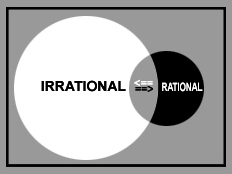@ Magnus Anderson.
We are in disagreement. But that is not a bad thing.
@ Obsvr524 + Magnus Anderson.
In my last post, I have (1.) not spoken of rational and irrational numbers, but of the rational and irrational in general, in reality, (2.) already pointed out several times that we have to separate the mathematical and thus the theoretical realm on the one hand and the practical or real realm on the other hand (we also do not say that mathematics and biology are the same thing), (3.) left the intersection of the rational and the irrational unnamed for very certain cases.
Not all poems are directly accessible to rationality, some not at all. But there are ways of hermeneutics, of understanding, which can lead to them becoming rationally accessible. But there can remain an realm that can not yet be assigned to the realm of the irrational and also not yet to the realm of the rational. This assignment is made by the rational, and sometimes it succeeds in taking something away from the realm of the irrational, i.e. in enlarging the realm of the rational (in other words: something was understood), but sometimes it does not succeed. And this realm, which can be assigned not yet to the irrational and not yet to the rational realm, that is the intersection of the rational and the irrational.
What about the situations?
Someone killed his wife out of hunger or out the “set of all hunger feelings”.
- Rational?
- Irrational?
- Not (yet) decidable?
The whole world is not only rational, the wohole world is irrational and rational and some or many things can not (yet) put in one of the two realms, because it is not (yet) decidable, where to put it. Some may be rational, some not, but then - later - they are just the other way around. You have to wait. The capability of waiting has gone lost. What you can’t decide at the moment, decide it later. The intersection is a good thing for those who can (still) wait.
What is harmony?
- Rational?
- Irrational?
- Not (yet) decidable?
What is “rational harmony” for Trump?
- Rational?
- Irrational?
- Not (yet) decidable?
What is “rational harmony” for Biden?
- Rational?
- Irrational?
- Not (yet) decidable?
What is “rational harmony” for a 10 years old child?
- Rational?
- Irrational?
- Not (yet) decidable?
God?
- Rational?
- Irrational?
- Not (yet) decidable?
The not (yet) decidable belongs to the intersection.
We do not know who possesses the absolute truth - in former times this possession was reserved to God. And today? To the mass media! To the “man” (Heidegger), i.e. to the inauthenticity!
![]()
